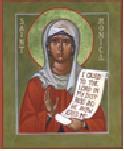
Feast day: 27 August
Saint Monica is known to us because she was the mother of Saint Augustine, the illustrious Church Father. When, in later life, he came to set down his account of God's working in his heart and life, his Confessions, he told of the hugely important part played by his mother. Hence we see Saint Monica through the window of her son's recollections; other aspects of her life, so distant in time from our own, are hidden from us.
She was born in 332 in Thagaste, in what was then the Roman province of Numidia, present day Algeria. She is thought to have been of Berber ancestry but her family was Roman by culture and Christian, and she grew up to be devout and intense in her faith. At a suitable age she was married to Patricius, a pagan, by whom she had three children. The marriage was a difficult one according to Augustine, for Patricius, though a very generous man, had a violent temper and was also unfaithful to his wife. She seems to have been blessed with great tact and discretion and been adept at handling her difficult husband, and Augustine records her as acting as advisor to other women in similar situations. He shows her to have been a prayerful and active Christian who took care to educate her children in the basics of her faith.
Monica and Patricius were of modest means, but recognising that they had an extraodinarily gifted son they made sacrifices to give him the education that was vital to his advancement, sending him to study in Carthage. Augustine by this time could no longer accept Christianity, and his lifestyle left much to be desired. His mother devoted her considerable spiritual energies to bringing him back to the faith. A bishop of her acquaintance is famously quoted as having told her that "the child of so many tears can never be lost”.
About this time Patricius died, but shortly before his death Monica's prayers for her husband were answered and he converted and was baptised. Augustine, however, having rejected Christianity, became a Manichee. She responded by banning him from her house. However, Monica was a visionary, who paid careful attention to her dreams as possible revelations of God's will for her. Guided by a vision, she became reconciled with him and devoted herself to unceasing prayer for his conversion.
When Augustine decided to leave Carthage for Rome, where he would have better prospects, Monica followed him to the coast, determined that he should either accompany her back home or take her with him. He tells, shamefacedly, how he managed to give her the slip and get away without her. Heartbroken, she risked the sea journey anyway and followed him, but by the time she got to Rome he had moved to Milan where, through influential contacts, he had obtained the post of Professor of Rhetoric. This was a very important political appointment, since the Imperial court resided in Milan. Augustine’s career, it seemed, was assured, but of even greater importance to his mother was his continued doubt about the Christian faith. She followed him to Milan.
The move to Milan was the turning point in both their lives because there they both came into contact with the aristocratic and highly educated Bishop (later Saint) Ambrose, who was promoting the Christian faith in his city with great vigour and learning. Monica now had a powerful ally in her task of bringing her son back to the Christian Church, and Bishop Ambrose gained a staunch supporter. Through the pen of Augustine we see Monica busily involving herself in church affairs. With others of his flock she stood by Ambrose in a dangerous act of civil disobedience, when he defied the orders of the Emperor’s mother to hand over a church in Milan to heretical Arian Christians.
She helped Augustine to arrange an advantageous marriage to a Christian girl of good family. This meant that Augustine’s much loved, long-time concubine, mother of his teenage son, had to go. Monica took the necessary steps and sent her back to Africa. In the event the marriage never took place. Augustine’s life took a totally different turn and he broke the engagement. With overwhelming joy and gratitude Saint Monica saw her long years of prayer and struggle for her son come to fruition. In his early thirties, Augustine finally converted to Christianity. In Milan, at the Easter Vigil of 387, he and his son, Adeodatus, were baptised.
The following year they and Monica decided to return to Africa together. But it was never to happen. When they reached the port of Ostia, near Rome, she fell ill and in a short space of time died. Augustine was prostrate with grief and years later wrote a very moving account of his mother’s last days. Towards the end she told him: “I do not know what I should do here any longer or why I am here, now that my hope of this world is gone. There was one thing for which I desired to linger a while in this life, and that was to see you a Catholic Christian before I died. God has done this for me more than abundantly, for I see you now his servant, despising earthly happiness. What am I doing here?”
Saint Monica’s work on earth was done. The example she set of trustful perseverence in prayer has inspired many in the centuries since she lived, especially mothers of troubled offspring. Her lasting legacy is the contribution made by the son who cost her so many tears to the intellectual life of the Church as bishop, philosopher, theologian, Doctor of the Church.
Saint Monica, pray for us.